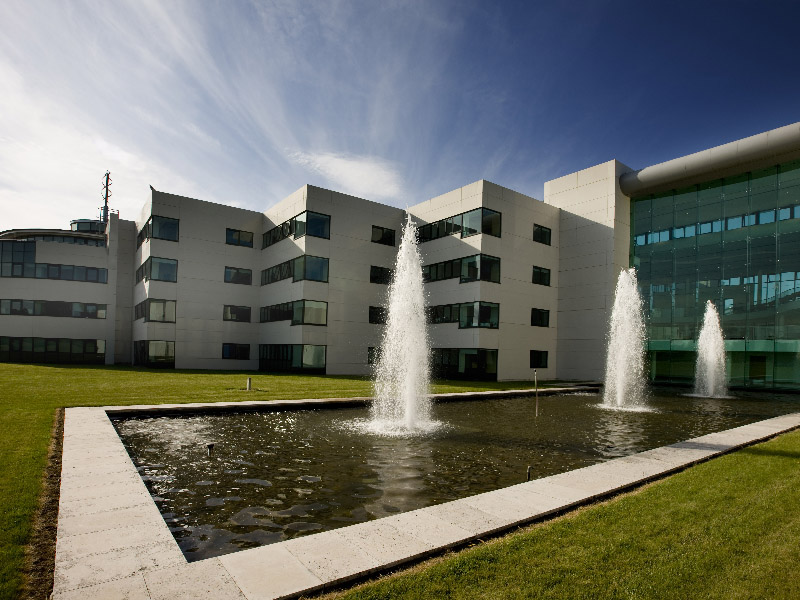When Steven Powell, M.D., talks with patients, he explains genomic medicine this way:
“You have to know your enemy if you’re going to war,” the Sanford Health oncology and hematology physician said. “Genomics is the intel that tells you how that cancer is growing. What is making it survive? Genomics allows you to try to identify it and stop it in its tracks.”
Sanford Health has partnered with Hermitage Medical Clinic in Dublin, Ireland, to develop a clinical research office that will help them get to know the enemy.
Specifically, the collaboration seeks to optimize cancer treatment using targeted therapies through the extension of Sanford’s COMPASS program for genomic tumor analysis.
“We’ve always said this is just the starting point of our relationship with Sanford Health,” said Emily O’Donovan, Hermitage Medical Clinic research director. “I can see getting involved with some of the other clinics within Sanford’s world programs and in other areas of medicine outside oncology.”
Transatlantic tumor board
The two organizations entered into a collaborative agreement in December 2017 as part of an expansion of Sanford World Clinic, Sanford Health’s international health care arm.
Since then, they have continued to build on a relationship that has now advanced to establishing a research office.
Similar to other locations within the Sanford World Clinic network, it is an effort to foster partnerships with health care leaders in the development of sustainable services around the world.
Podcast: World Clinic makes lasting health care changes
“Ireland in some ways is a lot like the Dakotas,” Dr. Powell said. “There are some larger cities on the coasts but a large part of their population is rural. They’re trying to deliver care to patients who often have to do a lot of traveling back and forth.”
At the Hermitage Medical Clinic, Dr. David Gallagher has been a leader in introducing genomic treatments to his native country. The opportunity to work in tandem with Sanford Health has led to more opportunities for research and the potential for advancements on both sides of the Atlantic.
“David Gallagher wanted to expand their genomics program there,” Dr. Powell said. “At the same time the partnership started, we were really ramping up our precision oncology and genomics program here. … We really worked together to try to build our programs in tandem with one another. We’ve been able to learn from one another in the process.”
Professor Gallagher now sits on the Sanford Health tumor board to discuss treatment for different cancer cases. On a weekly basis he joins Sanford colleagues online to exchange information and expertise involving specific patients.
“Prof. Gallagher was keen to use the expertise and knowledge that Sanford had in the area of molecular profiling,” O’Donovan said. “We wanted a forum where we could discuss results. And that’s what has happened. We send the patients’ tumors in for testing and we discuss those results with our colleagues at Sanford.”
Genomic medicine in primary care
Sanford Health’s efforts integrating genomic medicine into its care are well established. Sanford Imagenetics was the first program in the nation to embed the latest in genomic medicine with primary care.
Those efforts continue now with the Hermitage Medical Clinic as part of a team running studies that have the potential to push the research forward for everyone.
“Our patients see it as a way of getting another opinion on their results and getting multidisciplinary input,” O’Donovan said. “It’s a way we can improve the service for our patients here.”
Genomics remains a relatively new kind of health care. As such, insurance companies’ willingness to include it in coverage plans has taken work in the United States and now in Ireland.
“One of the first things we worked with them on was trying to get insurance companies to cover genetic testing,” Dr. Powell said. “To do it here took years of going back and forth with insurers, and some still aren’t interested. Now that testing has become more available over there, we’ve been able to show them what we’ve accomplished. We can show them some of the outcomes. It was eye-opening for the insurers to see that and say ‘Hey, we’re going to start covering this for some of our patients here.’”
“We are learning from one another about how we do things,” Dr. Powell said. “It’s all about getting the patient access to the treatment they need.”
Motivation to continue is coming in the form of results, Dr. Powell said. Treatments are becoming more effective as genomic research advances.
“When we started we maybe had one or two drugs available for us to use for targeted therapies,” Dr. Powell said. “Now we’re in the 20s and 30s on the number of drugs available to us. And every month that goes by, it seems we’re approving a new drug to target a specific mutation in cancer.”
Built on a foundation of collaboration, that progress promises to continue. O’Donovan knows that based on her clinical background but also based on a weeklong visit to South Dakota to spend time with Sanford cohorts.
“I was really impressed by the can-do, let’s-make-this-work attitudes,” she said. “We can bring that back here to our patients. We work well and gel together very well. Everyone has been really helpful in making this work.”
Learn more
- Sanford Health continues to fight pandemic in U.S. & abroad
- Podcast: Why a tumor board is critical to breast cancer care
- Sanford genetics group shares benefits of custom kids’ care
…
Posted In Cancer, Cancer Treatments, Family Medicine, Genetics, Research, World Clinic
